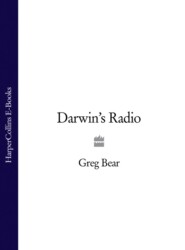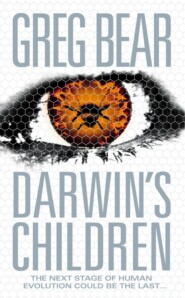По всем вопросам обращайтесь на: info@litportal.ru
(©) 2003-2024.
✖
Quantico
Настройки чтения
Размер шрифта
Высота строк
Поля
‘I thought you’d say that.’ Andrews walked around to the back of the truck and opened the gate, then pulled down a rack stuffed with rounded foot-high cylinders, six of them, striped black and yellow like the business end of a hornet. One by one, he plucked four from the rack and let them roll in the dust, inert. ‘How many of my little beauties do you want?’
‘Two for now, one at a time,’ Griff said. ‘Best if they can squeeze through that opening without jiggling the barn door.’
Andrews opened the aluminum case and pulled out earnodes and gogs. ‘We’re on Lynx with bombnet and HDS,’ he said. ‘The bots will relay pretty good pictures. If they find anything, I suggest we just close the roads and blow the whole damned thing. You’ve got your man, right?’
‘I want to see what he has in there,’ Griff said. ‘When he tried to blow my head off with his shotgun, he was happy. The last words he said were, “Death to the Jews.”’ Well, not quite the last words. But it makes my point.
‘There aren’t many Jews around here,’ Andrews said.
Griff stuck his hands in his pockets. Christ, he was tired. He just wanted this to be over, to find out how his son was doing at Quantico, to lie in bed and pull the covers up to his shoulders and breathe deeply of a dark quiet bedroom’s home-scented air.
‘Exactly,’ he said. ‘In his sixty active years, Robert Chambers worked with mobsters, the IRA, Thai smugglers, probably the Russians, and Aryan Nations. Is there anyone here who isn’t curious about what he really meant, and who else he might be connected to?’
Watson raised her arm. ‘Me,’ she said like a student in class. She looked around the group. ‘Just joking.’
Griff ignored her. ‘Can one of those fit through that opening?’
‘I think so,’ Andrews said. ‘Armatec 9 D-lls and a D-l2. They’re smaller and cheaper than last year’s models, and so far they’re pretty damned good. Each one is a little different, you know. Custom programs, more and more independent. I’ve named them all.’ He upended one of the cans and unscrewed the container cover. Inside, folded and strapped into a compact unit, was a cross between a go-kart and a cockroach, with three wheels mounted on springs and pistons and five triple-jointed legs, two in the front and three in the rear. Andrews unlatched the bot and it stretched out with a hydraulic sigh. A pole as thick as a pencil rose from a lozenge-shaped ‘head’ above a three-wheeled base plate. The head looked like the bridge on a toy ship. The pole thrust out two little black eyes on thin flexible stalks. A third eye was mounted on the pole itself, centered just below the stalks. Pressed into grooves behind the head were two retracted arms with graspers and cutters extensible from their tips. Griff, vaguely familiar with Armatec bots, looked for and saw the case that contained the scanner kit—fluoroscope and stethoscope, along with remote chemical analyzer. He also spotted two disruptors, slender barrels mounted behind the head designed to shoot slugs into bomb detonators. Unfolded, the bot was about fifteen inches long, with a wheelbase of six inches.
‘This one’s Kaczynski. These guys here are McVeigh and Nichols. And this one, the temperamental one, is Marilyn Monroe.’ Marilyn was bigger than the others.
Rebecca walked up to the nearest wooden post and examined the wires strung overhead. ‘I’ll bet it’s some sort of antenna. But it’s new to me. No sign of it being wired to the barn, but the wires could be buried.’ Rebecca patted the post. Griff could not read her expression. ‘We’re at solar max,’ she said. ‘Auroras all the way down to San Diego, prettiest I’ve ever seen—like a sign from God. Was the Patriarch the kind of guy who liked to watch the skies?’
CHAPTER TEN Quantico (#ulink_437c7f5f-3cea-5352-82a8-9cef5d958829)
William walked briskly to the library to drop off two texts. Along the way, two agents in red shirts ran past double-time, heading for the lounge, eager to see the bombnet telecast. He was in no hurry. Bombs held little interest for him. Having to wait up long nights as a boy for his father to come home had cured him of any interest in blowing up model airplanes with firecrackers or concocting little pipe bombs to light off in the woods. There had of course been those weeks when Griff had taught him about fireworks…Odd, exciting weeks. He’d almost forgotten about them.
He passed part of the Academy art gallery—framed prints lining the walls, all realistic and comforting, landscapes and farms and domestic situations. These he liked well enough. They served as a perfect counterbalance to gory crime scene photos and shoot-’em-ups in training. Why we fight. His favorite was of a young blond girl tending a newborn calf in a grassy field. He paused for a moment in front of the framed print. He really wanted to be there with that girl and that calf.
William Griffin was aware he looked nothing like the typical FBI agent, if there is such a person. At six feet four inches tall, he certainly looked nothing like his father, a bluff, stocky bull of a man. Even after five years in the NYPD, William had acquired none of the solid decorum and steady, critical gaze of the good cop. Instead, his brown eyes tended to be sympathetic, humored, and friendly, and beneath a long, straight knife of a nose, his lips wore a perpetual, half-hidden smile.
He jogged up the stairs—PT had put him in great shape—dropped off the texts, and jogged down the stairs again, passing a glass case with some of the Academy’s prizes on display. He had studied these artifacts many times in the past few months and knew them by heart: weapons manufactured from household items—including an ice pick with an incised groove for poison—bomb-making materials, dogeared Arabic printouts of Al Qaeda manuals on killing and conducting terror operations confiscated from safe houses in Iraq, Germany, and England.
A meticulous model of an insect-carriage gunbot like the one that had almost killed his father in Portland.
The cases weren’t changed out often. Everyone was too busy to look back over their shoulders. And here he was, in the shadow of legends—including his own father—coming across as a gangling, bright but not too savvy agent trainee who had buck fever and a wicked way with a cholo stick.
Still, he was doing okay. In two days he would graduate—by the skin of his teeth.
He picked up his pace, turned the corner and jogged past the chapel. Then a return loop back by the art gallery. Had these been Hoover’s favorites? Not many students had much to say about Hoover. Most didn’t remember him.
In the study lounge, chairs and couches had been pulled up in front of an old model plasma TV with lots of missing pixels. Some students were still studying. Others had firmly fixed their gazes on the spotty display.
William walked up behind Fouad, who was sitting straight up in one of the lounge’s well-cushioned chairs. ‘Where’s this?’ William asked him.
‘Washington state,’ Fouad said. ‘A farmhouse has been raided. The Patriarch, Robert Chambers, was killed in a shootout. Erwin Griffin, is he your father?’
William let out his breath. ‘Yeah,’ he said.
‘Well, he is due to go into that barn and discover if there is a bomb. Everyone with bomb expertise is listening. It is very interesting, very frightening.’
William pressed his teeth together and sat on the arm of Fouad’s chair. Saturday night at the Griffin household. ‘Griff’s at it again,’ Mom would say, sitting at the dinner table with her son and an empty chair, a plate set out, on more than one occasion with tears streaming down her cheeks. ‘I can feel it. Can’t you?’
Then he recognized his father, seen from behind—stocky and poised, of medium height, standing with two others in front of a big barn. A shiny bomb squad truck with Washington State Patrol
Вы ознакомились с фрагментом книги.
Приобретайте полный текст книги у нашего партнера:
Приобретайте полный текст книги у нашего партнера:









